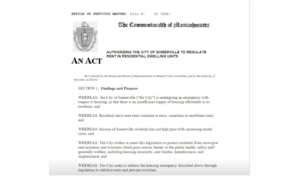Political representatives are evaluating how mental health challenges in young adults can be addressed
(Somerville Wire) – Since the onset of the pandemic, parents, school officials, and City leaders have been working to address the issue of trauma in youth. On May 3, Councilor Katjana Ballantyne put forth an order at a Public Health and Public Safety Committee meeting, demanding that Director of Health and Human Services Doug Kress discuss how much planned funding will be allocated toward trauma training initiatives for youth in the coming years. Ballantyne said that she is principally concerned with the isolation and loneliness that young people had been experiencing.
“I’m coming at this from the perspective of listening to some of our community members, doctors and parents who are in the healthcare profession, who have identified that remote learning is unhealthy, and it has a mental health impact,” said Ballantyne. She added, “I’ve heard enough in the community and read in the news that there is a concern that there is going to be trauma that has to be addressed.”
According to Superintendent of Schools Mary Skipper, virtual learning has not been the only cause of trauma during the pandemic. Parents have lost jobs, while students may have grappled with depression. Food insecurity has also been a problem, and the schools found themselves having to become a primary food provider. Director of Student Services Liz Doncaster had a team that was tasked with knocking on doors when students disappeared for a day or two and could not be reached.
“This is an area where we tried to be as proactive as possible, not knowing how long this would be going on for or what exactly our students might be going through,” said Skipper. “In what we encountered last spring, through the summer and into the fall, was what we thought we might, that cracks in family stabilization got worse. Many of our youth were in unstable housing situations, where they were finding themselves needing to stay with another relative, outside the city, sometimes inside the city, a lot of multigenerational sharing. We also saw a lot of impact of COVID itself, both on health of family members and health in our youth. Our students saw and experienced grief, losing members of their family, sometimes parents, or close aunts, uncles, and cousins. They themselves got sick. So there was just a great deal that they struggled through with this.”
Kress said that he has proposed a request for $20,000 to provide trainings for community members, community agencies, and staff, who will support youth. Funds will also go towards counseling, with an emphasis on eliminating language and cultural barriers. According to Kress, the City has a limited number of social workers, counselors, and therapists with the needed language skills, and those who do have them are often overbooked. Funding would also go towards working with smaller groups, utilizing a tiered level of support model.
“Level one would be [like] group work, where everybody gets this. That could be around mental health first aid training. That’s open to everybody,” said Kress. “The next level is that somebody might need beyond just understanding that and having a baseline about mental health. It could be around … getting a group of kids who are young people or adults together, who have something in common [a more focused population].” He added, “The next level up from that would be doing one-on-one counseling and looking at some of that. We really want to make sure that we’re looking at the different tiered levels and how to provide supports within each of those different levels, as well.”
Kress said that the City is also looking into creating a center for young people, a common space where students could come to hang out. There would be programming there, and agencies would be able to visit and provide support to students.
“There’s not a lot of space in Somerville,” said Kress. “How do we make sure that there’s a place where young people can come together and be able to have a place of their own? While the school is amazing and is fantastic—and the new building is great—we still have to recognize that there are some kids who the school is not a good thing for them. There are some kids that just want to have other spaces that they have access to.”
Chief Communications and Development Officer of Somerville Public Schools Susana Hernandez Morgan said that the school system will continue to support students, as the summer approaches.
“Trauma can surface in a number of different ways, during this really unprecedented time,” said Morgan. “Students and families are facing situations that they just have not faced before, that none of us have faced before. We took a very holistic approach and very much a community approach to supporting our students. … Community organizations and individuals stepped up to the plate immediately, to be able to provide the necessary basic resources that families needed. It’s something that I’m sure we’ll continue to see, as we continue to move in a more positive trajectory, in terms of the virus.”
All Somerville Wire articles may be republished by community news outlets free of charge with permission and by larger commercial news outlets for a fee. Republication requests and all other inquiries should be directed to somervillewire@binjonline.org.
SUBSCRIBE TO THE FREE SOMERVILLE WIRE EMAIL NEWSLETTER: https://eepurl.com/hpBYPv
Shira Laucharoen is assistant director of the Boston Institute for Nonprofit Journalism and assistant editor and staff reporter of the Somerville Wire.





